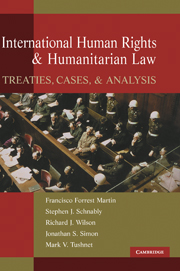Book contents
- Frontmatter
- Contents
- TABLE OF SELECTED AUTHORITIES
- PREFACE
- 1 AN OVERVIEW OF INTERNATIONAL HUMAN RIGHTS AND HUMANITARIAN LAW DEVELOPMENT AND THEIR PROTECTION MECHANISMS
- 2 FORMAL SOURCES AND PRINCIPLES OF INTERNATIONAL HUMAN RIGHTS AND HUMANITARIAN LAW
- 3 INCORPORATION OF INTERNATIONAL HUMAN RIGHTS AND HUMANITARIAN LAW IN U.S. LAW
- 4 INTERNATIONAL HUMAN RIGHTS TRIBUNAL PROCEDURE AND REMEDIES
- 5 SUBSTANTIVE INTERNATIONAL HUMAN RIGHTS AND HUMANITARIAN LAW PROTECTIONS
- 6 THEORY AND CRITIQUE
- INDEX
3 - INCORPORATION OF INTERNATIONAL HUMAN RIGHTS AND HUMANITARIAN LAW IN U.S. LAW
Published online by Cambridge University Press: 05 June 2012
- Frontmatter
- Contents
- TABLE OF SELECTED AUTHORITIES
- PREFACE
- 1 AN OVERVIEW OF INTERNATIONAL HUMAN RIGHTS AND HUMANITARIAN LAW DEVELOPMENT AND THEIR PROTECTION MECHANISMS
- 2 FORMAL SOURCES AND PRINCIPLES OF INTERNATIONAL HUMAN RIGHTS AND HUMANITARIAN LAW
- 3 INCORPORATION OF INTERNATIONAL HUMAN RIGHTS AND HUMANITARIAN LAW IN U.S. LAW
- 4 INTERNATIONAL HUMAN RIGHTS TRIBUNAL PROCEDURE AND REMEDIES
- 5 SUBSTANTIVE INTERNATIONAL HUMAN RIGHTS AND HUMANITARIAN LAW PROTECTIONS
- 6 THEORY AND CRITIQUE
- INDEX
Summary
U.S. Constitution
Article I, §8
The Congress shall have Power …
(10) To define and punish Piracies and Felonies committed on the high Seas, and Offences against the Law of Nations;
(11) To declare War, grant Letters of Marque and Reprisal, and make Rules concerning Captures on Land and Water….
Article I, §10, cl. 1.
No State shall enter into any Treaty, Alliance, or Confederation; grant Letters of Marque and Reprisal….
Article II, §2, cl. 2
[The President] shall have Power, by and with the Advice and Consent of the Senate, to make Treaties, provided two thirds of the Senators present concur….
Article VI, cl. 2
This Constitution, and the Laws of the United States which shall be made in Pursuance thereof; and all Treaties made, or which shall be made, under the Authority of the United States, shall be the supreme Law of the Land; and the Judges in every State shall be bound thereby, any Thing in the Constitution or Laws of any State to the Contrary notwithstanding.
Construction Rules
In this section, we examine different rules for construing the Constitution, federal statutes, and state law in conformity with international law.
Constitutional Construction
In the following subsection, we examine different rules of construing U.S. constitutional provisions in conformity with the United States' international legal obligations as a means of incorporating international law.
- Type
- Chapter
- Information
- International Human Rights and Humanitarian LawTreaties, Cases, and Analysis, pp. 175 - 269Publisher: Cambridge University PressPrint publication year: 2006



